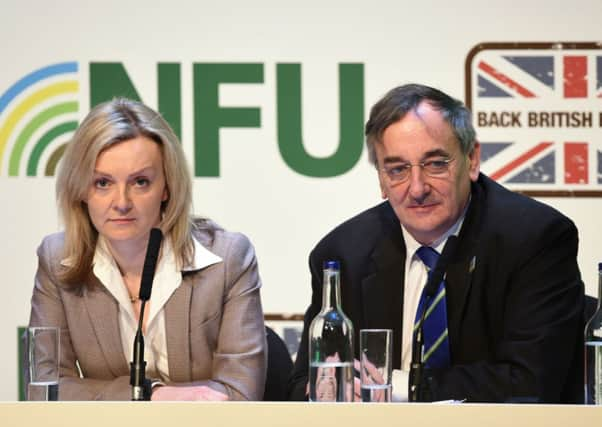Farmers told culling policy is beating disease spread


Ms Truss refused to be drawn on whether wider culling of badgers to tackle the disease in livestock could take place this year if the Conservatives win the general election, but she did insist that the Party would continue with their 25-year TB eradication strategy, which includes a roll-out of the badger cull.
Her comments came as National Farmers’ Union (NFU) president Meurig Raymond said the incidence of TB had decreased on farms in two pilot areas in Somerset and Gloucestershire where culling of badgers has taken place over the last two years.
Advertisement
Hide AdAdvertisement
Hide AdSpeaking at the NFU’s annual conference in Birmingham, he urged politicians not to make the controversial cull “a party political issue” in the run-up to the general election, and criticised Labour for pledging to give up on culling.
Ms Truss told the conference: “It is shameful that under the previous government bovine TB increased nine-fold and we ended up with the highest levels of the disease in Europe. It is incredible that they would like to make the same mistake again.”
She said the Government’s strategy included cattle movement controls, vaccination in “edge” areas around disease hotspots, and culling where the disease is rife.
“We will not let up, whatever complaints we get from protest groups. We’re in it for the long haul. We will not walk away,” she said.
Advertisement
Hide AdAdvertisement
Hide AdSpeaking to journalists after her speech, she said: “I’ve been very clear we will continue with the 25-year strategy, and that does envisage a wider roll-out of the culls.”
While she would not say when the roll-out could take place, Mr Raymond said there was no reason why - if the Conservatives get back into power and the strategy was still on the table - other areas would not be ready to start culling this year.
Mr Raymond told conference delegates that in the two pilot areas TB incidence had already declined - in the Somerset pilot area from 34 per cent two years ago to 11 per cent today.
And he said: “In Gloucestershire, vets are also reporting a reduction in TB in cattle too. And just two days ago, one of our Gloucestershire members was given the fantastic news that his farm is now clear of TB, for the first time in 11 years. He is very clear that the only thing that’s changed on his farm is that we are now doing something to control the disease in wildlife.”
Advertisement
Hide AdAdvertisement
Hide AdAnti-cull campaigners reacted angrily to Ms Truss’s comments.
Claire Bass, Humane Society International/UK’s executive director, said: “The badger cull has been a very expensive, cruel and ineffective farce and Liz Truss cuts an increasingly lonely figure in continuing to defend it.”
She claimed that “almost unanimous scientific opinion” described the cull as a failure.
‘Farming has to be priority’
NFU president Meurig Raymond urged the next government to make food and farming a priority on the first day of the conference yesterday.
Advertisement
Hide AdAdvertisement
Hide AdResearch from the NFU released ahead of the event suggested the UK’s self-sufficiency is in a 30-year downward spiral, with just 60 per cent of food needs met with produce from British farms.
At current rates, and with the UK population expected to grow to 70 million in 20 years, the figure could fall to 53 per cent by the 2040s, the NFU claimed, warning it would have serious implications for the economy, food security and employment.
Mr Raymond said that in 1984 the UK produced more than 80 per cent of what the country consumed, adding: “Who would want to lead the country down a path where we produce less than half the food we eat? This will be totally unacceptable to the British public and in no way in the national interest.”